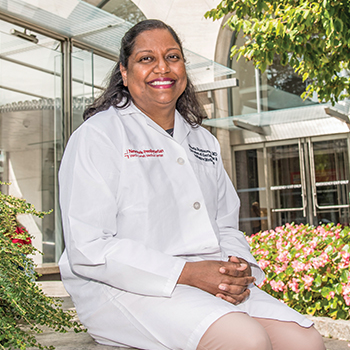Improving Care Transitions from Hospital to Home

Dr. Sharda D. Ramsaroop
The transition from hospital to home is for many older adults a perilous period. The changeover often leaves patients vulnerable to medication discrepancies, and one in five suffers an adverse event. Studies have shown that patients with post-discharge medication discrepancies are twice as likely to be readmitted within 30 days. There had to be a better way to transition patients safely home, which is just what physicians in the Division of Geriatrics and Palliative Medicine at NewYork-Presbyterian/Weill Cornell Medical Center set out to do more than a decade ago.
“When I finished my fellowship in clinical geriatrics at Weill Cornell in 2007 and then joined the faculty, my practice was largely outpatient care,” says geriatrician Sharda D. Ramsaroop, MD. “We realized there were many people getting discharged from either rehabilitation centers or the Hospital with little to no follow-up and who were falling through the cracks.”
In making follow-up visits after a patient’s discharge from the Hospital, Dr. Ramsaroop discovered a number of patients had medication discrepancies. “During their follow-up visits, we would spend the majority of the visit focusing solely on the patient’s medications — 15 minutes or longer — to see if they were close to what we thought they were taking. We found about 65 percent of people would have at least one medication discrepancy compared to what was listed in their Hospital discharge records.”
The reasons for this varied from person to person, says Dr. Ramsaroop. “Some of it was attributable to discharge instructions that did not quite match what was in the final discharge note from the Hospital. Sometimes the patient thought they didn’t need the medications and would just stop taking them. In other cases, the caregiver didn’t quite understand the instructions. There were a host of reasons.”
During this period, the emphasis on care transitions was beginning to spread nationally. Dr. Ramsaroop, under the mentorship of Eugenia L. Siegler, MD, and M. Cary Reid, PhD, MD, and together with her Weill Cornell colleagues developed a post-discharge clinic at NewYork-Presbyterian’s Irving Sherwood Wright Center on Aging, which provides both primary care and geriatric consultation to older adults in an outpatient setting. The aims of the clinic were to ensure that patients discharged from the Hospital have access to timely, comprehensive, and multidisciplinary post-hospital care; to reduce hospital readmissions; and to ultimately disseminate a model of transitional care throughout NewYork-Presbyterian.
In developing the post-discharge clinic, the Weill Cornell team conducted focus groups with members of different disciplines, including internal medicine residents, physician assistants, and nurses within the Hospital to determine their knowledge and attitudes about hospital discharge. “They described the discharge process as chaotic, confusing, and frustrating, most often because of time constraints and difficulty ensuring communication amongst all providers involved in the discharge process,” says Dr. Ramsaroop. “Their suggestions for improvement in the process included designating a ‘transitionalist’ for patient and caregiver education and calling on a clinical pharmacist for medication reconciliation.”
A dedicated geriatrics consult team now follows all of the Wright Center’s patients who are admitted to the Hospital and notes when they will need a follow-up appointment. All discharged patients — whose average age is 84 years old — are seen within two weeks of discharge.
Prior to the 45-minute follow-up visit, the team reviews discharge summaries, clarifying information as needed. “At least half of the patient’s visit, and sometimes the whole visit, is spent discussing medications, including both prescription and over-the-counter medications, such as Tylenol,” explains Dr. Ramsaroop. “We review the medication list from the Hospital discharge summary with the patient and compare it with the patient’s pill bottles, lists, or their own report of medications being taken.”
Pharmacies and caregivers are contacted as needed to compile an accurate patient medication list, and staff use the Medication Discrepancy Tool to categorize and reconcile discrepancies, entering all information into a single database.
“The visit also includes a physician assessment and a discussion of health-related goals, self-management, and psychosocial needs,” says Dr. Ramsaroop. A social worker is available to address any psychosocial and home care requirements.
“All of the discharge summaries are automatically entered into the Hospital’s electronic health record system, which has made a huge difference in managing our older patients,” adds Dr. Ramsaroop. “The social work notes will tell us, for example, if the individual requires a visiting nurse or home physical therapy or a home health aide. The electronic health record also allows us to immediately send progress notes to the primary care physician and specialists within our healthcare system.”
According to Dr. Ramsaroop, patients have been very receptive to the follow-up program. “In the beginning they would ask, ‘Why do I have to come back? I just left the hospital.’ Now it’s easier to convince people that they really do need to come in and that there are things that we can do to help them,” she says. “The program has grown from seeing two to three patients a month to an average of 30 patients a month, with a total of 400 patient visits to date. There is so much we can do to help meet the needs of these vulnerable patients — especially the homebound population — with access to home care and community resources.”
“The transitional care program at Weill Cornell is an important stepping stone for the future,” adds Dr. Ramsaroop. “It has been a valuable opportunity to teach medical residents and geriatric fellows about the importance of care transitions for older adults. Transitional care is now nationally recognized as an important area of medicine. The Centers for Medicare and Medicaid Services has developed incentives for physicians to include care transitions into their practice. The program at Weill Cornell will continue to expand and work to provide the necessary care for older adults as they transition through the system.”
For More Information
Dr. Sharda D. Ramsaroop | [email protected]



